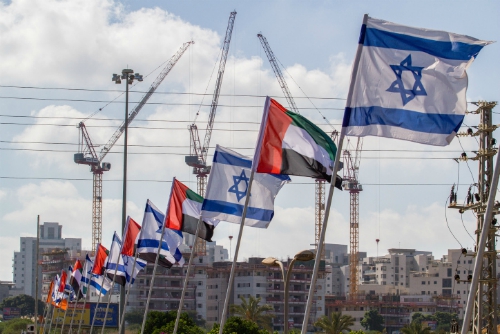By Israel Kasnett, Israel Hayom via JNS
Israel’s deal with the United Arab Emirates, which will soon include a signing ceremony affirming full normalization of relations between the two countries, continues to bear good news.
After a maiden El Al flight touched down last week in Abu Dhabi, Saudi Arabia, then Bahrain, announced that it will allow flights originating from and flying to Israel to traverse its airspace. Also last week, the UAE formally closed the door on its 48-year boycott law, thereby allowing UAE companies and individuals to trade directly with Israel.

Flags of Israel and the UAE in Netanya, Aug. 16, 2020. (Flash90)
Bahrain, Oman and Morocco may be next to normalize relations with Israel and UAE’s Crown Prince Mohammed bin Zayed has announced he would like to visit Jerusalem soon to finalize the agreement.
All these good tidings are exciting, but Joshua Teitelbaum of the Dept. of Middle Eastern Studies at Bar-Ilan University in Ramat Gan was more cautious, saying that each side is interpreting the deal differently.
He told JNS that if you look at the Aug. 13 statement released by the parties, each side views it from their own perspective, while still remaining loyal to the spirit of the text.
For instance, while the statement reads, “The parties will continue their efforts . . . to achieve a just, comprehensive and enduring resolution to the Israeli-Palestinian conflict,” it is possible Israel and the UAE have different ideas of how this needs to come about.
The statement uses all kinds of language, but it does lay out certain steps establishing concrete measures on the ground, such as “to sign bilateral agreements regarding investment, tourism, direct flights, security, telecommunications, technology, energy, health care, culture, the environment, the establishment of reciprocal embassies and other areas of mutual benefit.”
“It is definitely a historic agreement,” said Teitelbaum, “but it is not yet a full peace.”
Gil Feiler, a senior research associate at the Begin-Sadat Center for International Studies at Bar-Ilan University, specializing in Arab markets and economies, noted that most of the dealings between the UAE and Israel will take place between government agencies and companies.
He split the deal into three stages.
The first stage will see the two governments working on bilateral cooperation in seven key areas: investment, finance, health, the civilian space program, civil aviation, foreign policy and diplomatic affairs, and tourism and culture.
The second stage would see businessmen in the UAE who are close to the government and the decision-makers receiving a green light to work with Israel. They will focus on cyber technology, startups, water technology, joint research and more.
The third stage will see the rest of the local population involved in retail working together with Israeli businesses.
It is unlikely, according to Feiler, that Israeli businesses have much to offer Dubai, which already has access to everything.
It is possible that the famed Jordan Valley’s Madjoul dates or Dead Sea products could be marketed there as exclusive items and be successful.
According to Feiler, “most of the business interaction will take place between government agencies and Israeli high-tech companies.”
‘A legitimate entity in the region’
The deal also seems to have spurred diplomatic movement outside of the Arab Gulf states; a US-brokered deal between Kosovo and Serbia led to last week’s announcement that each country would move to open embassies in Jerusalem. While reports that Sudan could normalize ties with Israel have been floated in recent weeks, its African neighbor Chad says it, too, may be willing to open an official mission in Jerusalem.
On the Israeli domestic front, the deal also accompanied an announcement that the Jewish state would suspend applying sovereignty to areas of the West Bank, leading to some anger on the right.
Regarding Israeli right-wing reactions to the sovereignty issue — another gray-area issue that may see differences between the UAE and Israel bubble to the surface — Teitelbaum said he believes that “once the coronavirus is over, and once Israelis discover the Disneyland of shopping that is Dubai, many people who support [Netanyahu] may forget about the issue of annexation.”
What seems clear is that this was a UAE-Israel deal, and the Americans were allowed the optics of making it seem like it was nudged along by them.
As Teitelbaum put it, the 1978 Camp David Accords and 1993 Oslo Accords “were both signed on the White House lawn, and this deal will likely be signed there as well.”
“Anyone would want to be on the good side of the Americans,” he said. “Everyone wants to be in their good grace, and everyone lets them take the credit.”
Pivoting to Qatar, Teitelbaum said while the country is pro-Hamas, Israel needs it to provide money to Gaza to maintain stability there.
“The issue with Qatar is not that we have good relations with them. It’s been up and down,” he said.
Qatar was the first Gulf country to engage in relations with Israel in 1996 after Oslo, but permanently severed trade relations in 2009 following “Operation Cast Lead,” Israel’s three-week war against Hamas, during which the Israel Defense Forces endeavored to destroy terrorist infrastructures in the Gaza Strip, in particular rocket-launching capabilities.
“It’s not a good relationship,” said Teitelbaum. “It’s a practical relationship.”
Qatar’s support for Gaza “keeps the situation and people satisfied enough so Hamas does not feel it needs to escalate,” he said. “There’s no love there. It’s just practical.
What about other Arab countries following the Emirates’ lead?
“Saudi Arabia has done a lot of signaling towards Israel,” said Teitelbaum, adding that “they have a lot more complications at home.”
“Their economy is not doing well. There’s been a lot of opposition at home. MBS [Crown Prince of Saudi Arabia Mohammed bin Salman] has come under a lot of criticism internationally for the murder of [Washington Post journalist] Jamaal Khashoggi,” he pointed out.
“I don’t see them leading the way here,” he said, “but we could see Bahrain and Oman doing this soon.”
And the reason these countries are now flocking to Israel, stressed Teitelbaum, is because Israel has established itself as “a legitimate entity in the region.”
“When these countries have peace with Israel, it gets harder for other countries and the Europeans to pressure Israel,” he noted, saying that it also “puts more pressure on the Palestinians to get something done.”

















One thought on “Breaking down the UAE-Israel deal”